OPINIONS OF THE PRESS. MORNING HERALD—The present Government has the
advantage of baying at its head a man long known to the political world for those
statesmanlike talents which, though long excluded from power, have reflected lustre on the senate of England. It is true, his advanced age, if it brings with it the advantage of great experience, must have some- what diminished the energies which the direction of the affairs of a great empire, at a crisis of unexampled difficulty and peril, may be supposed to demand. But his character for high and unblemished integrity in always refusing to accept of place at the sacrifice of his principles, united to the enlightened moderation of his views, justly attracted to him the public confidence. Though austere in his deportment, and attached to his order, he has given, during a long public life, unequivocal proofs of a comprehensive regard for the rights of the whole people. Having no unworthy jealousy of the abilities of others, he hai formed an Admini- stration strong in the variety of talent which it possesses. But disposed as we are to presage well of such a Ministry, we will only judge of it by its acts. We know that the temptations and dangers by which it is beset would task the severest public virtue and wisdom, and we do not, therefore, presume to forestal the verdict of the country. As we have already said, this Administration must stand or fall by the pledges which they have given, and the principles which they profess. The chief attention of the public will be directed to their plan of Parlia- mentary Reform. This will be the criterion of their capacity to govern a country circumstanced as England is at present ; for all persons who can reason on political affairs know that a system of retrenchment and economy can only work a temporary relief, unless the sources of venal and corrupt influence be closed by an effective reform in Parliament. As far as things have yet gone, we cannot but congratulate the country on a change which, whatever effect it may have on our domestic circum- stances, seems to ensure the preservation of the peace of Europe.
MORNING CHRONICLE—The new men enter on office under circum- stances, which, in one sense, maybe considered favourable, and in another unfavourable. Their predecessors (with a single exception, perhaps) are tittle respected, and they have nothing to fear in the way of comparison. But then the internal state of the country is one of peculiar embarrass- ment. The expectations of the people are high ; and much, conse- quently, will be expected from a popular Administration. Repeals of taxes and retrenchment will be expected, and, above all, Parliamentary Reform. The Aristocracy suffer greatly in popular estimation on ac- count of their possessing what is deemed an improper control over the representation. As landholders, no man in this country objects to them ; it is in their capacity of owners of boroughs. But the question is—will they renounce that power over the representation which is the cause of so much discontent throughout the country ? Ministers have, how- ever, agreed to make the attempt. Prudence demands, on the part of those who possess borough influence, great moderation at this conjunc- ture, because, if they should succeed in throwing difficulties in the way of Ministers, they would only accelerate their own ruin. The Treasury Boroughs will, of course, be against Ministers in all their plans of eco- nomy and reform. It may he a question whether a dissolution should not precede the discussion of the question of reform, that it may be sup- ported by the influence which naturally belongs to the Government. GLOBE—It is intended to abolish forthwith the place of Vice-Trea-
surer of Ireland, and that of Lieutenant-Genral of the Ordnance. The salary of the Master of the Mint, too, is saved by its union with the Presidentship of the Board of Trade. It is said also to be the intention of the Ministers to reduce their own salaries to the extent of one-third. So far so good. We may suggest—and it is a change which will be as fitly proposed by any independent member of Parliament as by the Ministers —that the salaries of the Judges should be brought back to the same, or nearly the same, amount at which they stood before the addition made to them a few years ago. Certainly there is no recompense which is ne- cessary to secure to the country able and honest judges, which ought to be grudged ; but the experience of the country shows that we obtained able judges before the increase, and that we have not had better since. The salaries were raised on a false pretence. The class of persons ap- pointed to judicial offices since, are the same as probably 'would have been appointed before the increase ; and certainly they would have been very happy to accept the appointments if no increase had ever taken place. The saving made in this way cannot be great ; but as it is necessary, in order to make the reductions effectual, to carry them down to the very lowest ranks of official men, it is necessary, in order that they may not hear the mark of injustice, that they apply also to the highest and most dignified, especially where recent and causeless augmentations have taken place. It has been well suggested in Parlia- ment, that after the discussion which took place on the civil list, the emoluments and duties of the Chancellor of the Duchy of Lancaster (an office which has been tilled up) ought to he inquired into. The appoint- ment, however, is during pleasure, and we presume has been made with- out prejudice to any disposition which the Ministers may advise the King to make of the revenues of the Duchy of Lancaster.


























 Previous page
Previous page